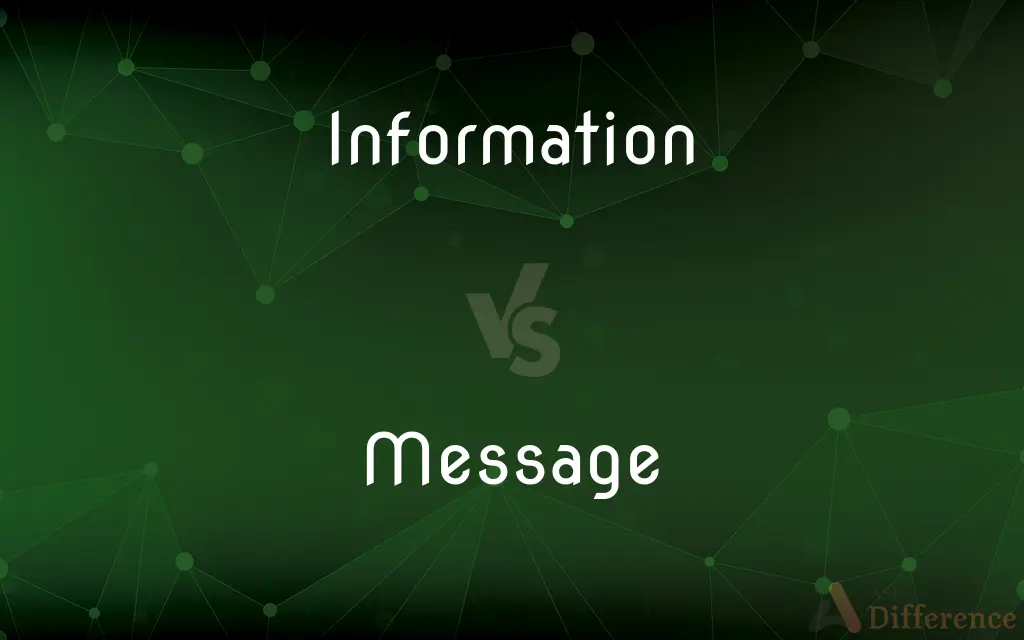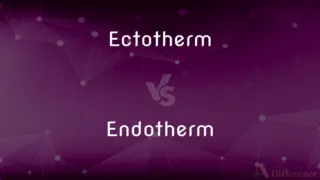Information vs. Message — What's the Difference?
By Maham Liaqat & Urooj Arif — Updated on March 17, 2024
Information is data processed for meaning, while a message is a specific set of information intended for communication.

Difference Between Information and Message
Table of Contents
ADVERTISEMENT
Key Differences
Information refers to processed, organized, or structured data that has a meaningful context, aiding understanding or decision-making. It is derived from data through analysis or interpretation, making it useful or applicable. On the other hand, a message is a form of communication that conveys information from a sender to a receiver. It is a specific set of information packaged and transmitted with the intent of being understood by its recipient.
While information can exist in various forms and serve multiple purposes, a message is specifically designed for communication, often with the intent to influence, inform, or elicit a response from the recipient. Messages are typically conveyed through language, symbols, or signals and require a medium for transmission, such as speech, writing, or electronic communication.
Information is a broader concept that encompasses all types of data that have been given meaning, including statistical data, facts, observations, and insights. A message, however, is a subset of information that is specifically constructed and sent with a purpose, targeting a particular audience or individual.
The value of information lies in its relevance and the context it provides, enabling individuals or systems to make informed decisions or to increase their knowledge. Conversely, the effectiveness of a message is determined by its clarity, the medium chosen for transmission, and how well it is received and understood by its intended audience.
In the digital age, the distinction between information and message becomes particularly important in the context of communication technologies, where vast amounts of information are transmitted as messages across various platforms, necessitating effective communication strategies to ensure that messages are not only sent but also appropriately received and interpreted.
ADVERTISEMENT
Comparison Chart
Definition
Processed data with meaning
Specific set of information intended for communication
Purpose
Aid understanding, decision-making
Influence, inform, elicit response
Form
Can be statistics, facts, insights
Packaged for communication, using language or symbols
Context
Broad, encompasses all meaningful data
Specific, targeting particular audience or individual
Value
In relevance and applicability
In clarity, effective transmission, and reception
Compare with Definitions
Information
Data processed for meaning.
The information from the survey provides insights into customer preferences.
Message
Information intended for communication.
The text message contained important updates from the team.
Information
Basis for decision-making.
Financial information is crucial for investment strategies.
Message
Seeks to influence or inform.
The president's speech delivered a message of hope and unity.
Information
Broad and multi-purpose.
The library offers a wealth of information on various subjects.
Message
Conveys through language or symbols.
The red light sends a message to stop.
Information
Derived through analysis.
Market trends information helps businesses make informed decisions.
Message
Requires a medium.
Emails are a common medium for professional messages.
Information
Contextual and relevant.
Real-time traffic information aids in choosing the best route.
Message
A message is a discrete unit of communication intended by the source for consumption by some recipient or group of recipients. A message may be delivered by various means, including courier, telegraphy, carrier pigeon and electronic bus.
Information
Information can be thought of as the resolution of uncertainty; it answers the question of "What an entity is" and thus defines both its essence and the nature of its characteristics. The concept of information has different meanings in different contexts.
Message
A verbal, written, or recorded communication sent to or left for a recipient who cannot be contacted directly
If I'm not there leave a message on the answerphone
Information
Knowledge or facts learned, especially about a certain subject or event.
Message
A significant political, social, or moral point that is being conveyed by a film, speech, etc.
A campaign to get the message about home security across
Information
The act of informing or the condition of being informed; communication of knowledge
Safety instructions are provided for the information of our passengers.
Message
An errand
He would run those interminable messages after school to the bookie
Information
(Computers) Processed, stored, or transmitted data.
Message
Send a message to (someone), especially by email
I was messaged by a Californian contact for some information
The software package incorporates messaging, scheduling, and workflow functions
Information
A numerical measure of the uncertainty of an experimental outcome.
Message
A usually short communication transmitted by words, signals, or other means from one person, station, or group to another
I found the message you left at my desk. She sent me a quick message by email.
Information
(Law) A formal accusation of a crime made by a public officer rather than by grand jury indictment in instances in which the offense, if a federal crime, is not a felony or in which the offense, if a state crime, is allowed prosecution in that manner rather than by indictment.
Message
The substance of such a communication; the point or points conveyed
Gestured to a waiter, who got the message and brought the bill.
Information
That which resolves uncertainty; anything that answers the question of "what a given entity is".
Message
A statement made or read before a gathering
A retiring coach's farewell message.
Information
Things that are or can be known about a given topic; communicable knowledge of something.
I need some more information about this issue.
Message
A basic thesis or lesson; a moral
A play with a message.
Information
The act of informing or imparting knowledge; notification.
For your information, I did this because I wanted to.
Message
To send a message to.
Information
A statement of criminal activity brought before a judge or magistrate; in the UK, used to inform a magistrate of an offence and request a warrant; in the US, an accusation brought before a judge without a grand jury indictment.
Message
To send as a message
Messaged the report by cable.
Information
(obsolete) The act of informing against someone, passing on incriminating knowledge; accusation.
Message
To send a message; communicate.
Information
The systematic imparting of knowledge; education, training.
Message
A communication, or what is communicated; any concept or information conveyed.
We've just received an urgent message from the President.
Information
The creation of form; the imparting of a given quality or characteristic; forming, animation.
Message
An underlying theme or conclusion to be drawn from something.
The main message of the novel is that time heals all wounds.
Information
[…] the meaning that a human assigns to data by means of the known conventions used in its representation.
Message
An errand.
Information
(Christianity) Divine inspiration.
Message
See groceries, shopping.
Information
A service provided by telephone which provides listed telephone numbers of a subscriber.
Message
To send a message to; to transmit a message to, e.g. as text via a cell phone.
Just message me for directions.
I messaged her about the concert.
Information
(information theory) Any unambiguous abstract data, the smallest possible unit being the bit.
Message
To send (something) as a message; usually refers to electronic messaging.
She messaged me the information yesterday.
Please message the final report by fax.
Information
As contrasted with data, information is processed to extract relevant data.
Message
(intransitive) To send a message or messages; to be capable of sending messages.
We've implemented a new messaging service.
The runaway computer program was messaging non-stop.
Information
(information technology) Any ordered sequence of symbols (or signals) (that could contain a message).
Message
(obsolete) To bear as a message.
Information
The act of informing, or communicating knowledge or intelligence.
The active informations of the intellect.
Message
Any notice, word, or communication, written or verbal, sent from one person to another.
Ehud said, I have a message from God unto thee.
Information
Any fact or set of facts, knowledge, news, or advice, whether communicated by others or obtained by personal study and investigation; any datum that reduces uncertainty about the state of any part of the world; intelligence; knowledge derived from reading, observation, or instruction.
Larger opportunities of information.
He should get some information in the subject he intends to handle.
Message
Hence, specifically, an official communication, not made in person, but delivered by a messenger; as, the President's message.
Information
A proceeding in the nature of a prosecution for some offense against the government, instituted and prosecuted, really or nominally, by some authorized public officer on behalf of the government. It differs from an indictment in criminal cases chiefly in not being based on the finding of a grand jury. See Indictment.
Message
A messenger.
Information
A measure of the number of possible choices of messages contained in a symbol, signal, transmitted message, or other information-bearing object; it is usually quantified as the negative logarithm of the number of allowed symbols that could be contained in the message; for logarithms to the base 2, the measure corresponds to the unit of information, the hartley, which is log210, or 3.323 bits; called also information content. The smallest unit of information that can be contained or transmitted is the bit, corresponding to a yes-or-no decision.
Message
To bear as a message.
Information
Useful facts, as contrasted with raw data; as, among all this data, there must be some interesting information.
Message
A communication (usually brief) that is written or spoken or signaled;
He sent a three-word message
Information
A message received and understood
Message
What a communication that is about something is about
Information
A collection of facts from which conclusions may be drawn;
Statistical data
Message
Send a message to;
She messaged the committee
Information
Knowledge acquired through study or experience or instruction
Message
Send as a message;
She messaged the final report by fax
Information
(communication theory) a numerical measure of the uncertainty of an outcome;
The signal contained thousands of bits of information
Message
Send a message;
There is no messaging service at this company
Information
Formal accusation of a crime
Common Curiosities
What makes information valuable?
Information's value lies in its relevance, accuracy, and the context it provides, enabling informed decisions and insights.
What is the primary purpose of information?
The primary purpose of information is to provide meaningful context that aids understanding, decision-making, or increases knowledge.
How does a message function in communication?
A message functions as a vehicle for conveying specific information from a sender to a receiver, with the intent of being understood and eliciting a response.
What factors influence the choice of medium for a message?
Factors include the nature of the information, the intended audience, the urgency of the communication, and the accessibility of the medium to the receiver.
How is the effectiveness of a message determined?
The effectiveness of a message is determined by its clarity, the appropriateness of the medium used for transmission, and how well it is received and understood by the intended audience.
Why is the distinction between information and message important?
Understanding the distinction helps in effectively packaging and transmitting information for specific communicative purposes, ensuring that the intended message is clearly received and understood.
How can the quality of information be assessed?
The quality of information can be assessed based on its accuracy, relevance, timeliness, and applicability to the context or decision at hand.
Can a message exist without information?
No, a message inherently contains information, as it is the packaging and transmission of information intended for communication.
Can the same information be conveyed in different types of messages?
Yes, the same information can be packaged differently in various messages, using different tones, mediums, or styles to suit different audiences or purposes.
What role do messages play in digital communication?
Messages are fundamental to digital communication, facilitating the exchange of information across various platforms and mediums, from emails to social media.
Share Your Discovery

Previous Comparison
Tone vs. Voice
Next Comparison
Ectotherm vs. EndothermAuthor Spotlight
Written by
Maham LiaqatCo-written by
Urooj ArifUrooj is a skilled content writer at Ask Difference, known for her exceptional ability to simplify complex topics into engaging and informative content. With a passion for research and a flair for clear, concise writing, she consistently delivers articles that resonate with our diverse audience.
















































